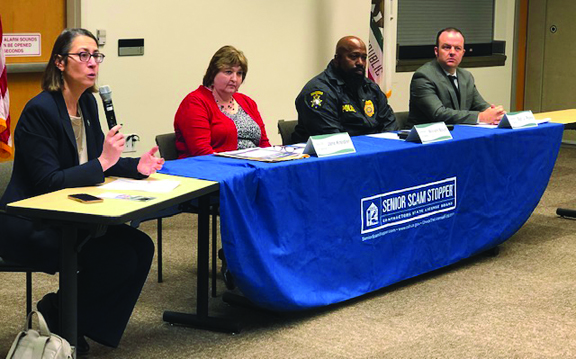
By Mary O’KEEFE
“Nationally in 2018, 16.7 million people in the U.S. alone were victims of identity fraud,” said Assemblymember Laura Friedman. “Thirty percent of U.S. consumers were a part of the data breach of companies in 2018.”
Friedman presented these statistics during a Scam Stopper Town Hall meeting last week held at the community room at the Glendale Police Dept.
“We would rather give you information up front that you need to protect yourself than have you recover [the funds] later,” said Friedman.
Friedman brought together three experts who covered a variety of identity, medical and construction frauds.
CVW will be covering each of these subjects in the next three issues.
Friedman said that over the course of the meeting, “What we are going to talk about runs the gamut from simple credit card fraud that pops up all of a sudden when you get a credit card charge you don’t recognize but you can resolve the [issue relatively quickly] all the way up to scams that are complex and involve people losing their life savings, sometimes even losing their homes.”
Friedman added the trauma of fraud runs “very deep” and some people never recover from the financial devastation.
“We deal with unlicensed board and care [facilities], which is an extremely lucrative business,” said Special Agent William Boyd, Dept. of Justice State of California.
He explained board and care facilities are those with two or more bedrooms. The smaller facilities are often in a home that has been converted to a “board and care.”
“Some say they will provide services for residents, have their clothing washed and other [help],” he said. “Then once the [person] gets to this place they find [these services are not provided].”
Independent living facilities are typically for residents who do not need assistance with daily activities. If residents need more help those services must be provided.
When a business designates itself as an assisted living facility it must have a license from the California Adult Care Licensing Program, which means the business is monitored by the State of California Dept. of Public Services. If the business is an independent living facility, it does not have to follow the same permitting guidelines, Boyd said.
Unfortunately, he added, by the time the residents find they are in an independent living facility the damage has already begun with the Medicare/MediCal information already shared with the facility.
“Your money will come in ways [like] Social Security,” he said. The owners/representatives of the company will have themselves designated as payees.
“They will take your money and will probably put you out,” he said. “They will still get your money; it’s still coming in, so they don’t need you.”
He added that credit cards in the resident’s name are also used by fraudulent facility owners.
Boyd said another scam residents should be aware of is when facilities list residents as being in hospice care, even though they are not. Hospice health care is used for those who are in the last stages of life due to an illness. Businesses can receive $5,000 to $8,000 a month for this type of care.
“You need a doctor to sign off on hospice,” Boyd said. “These [facilities] often have doctors who are willing to sign… They can get generally $5,000 for signing off.”
There are also other scams directed at insurance and Medicare/MediCal/Medicaid including ordering high-end wheelchairs and other equipment that is not needed but would be paid for by state/federal insurance.
“If you have someone knocking on your door and they say they will send someone to sit with you, or do the dishes, don’t give them your Medicare number,” he advised.
There are people who solicit business by offering in-home care and elderly residents, who understandably may want this type of help, will give their personal information. Sometimes when elderly people sign an agreement with someone offering in-home care, they never see a “representative” again because their personal information has already been obtained.
There are ways to protect against this type of scam, including never giving any personal information to people or businesses that have not been vetted properly.
Jesse Zamudio, executive director of Twelve Oaks Senior Living at 2820 Sycamore Ave., said the first thing he would suggest to anyone looking for an assisted or senior living facility is to check the public records through social services: http://www.cdss.ca.gov/inforesources/Adult-Care-Licensing.
“You can see all the reports. Check to see what citations they may have, what are open and what have been taken care of,” he said.
He pointed out there are assisted living facilities that have had citations issued but quickly take care of any problems.
“Then show up [to the facility] unannounced,” he suggested. This way the visitor can see a clearer picture of how the facility operates. He added there are a lot of scams that involve the health care industry and it is important to check out the facilities in all ways available.
Boyd added that for people who have a loved one in a facility it is important to check on them regularly.
“If a person is placed in an assistant living facility they need to be seen,” he said. “One of the biggest elder abuse [cases] we see is neglect.”
